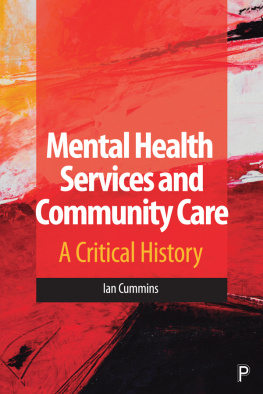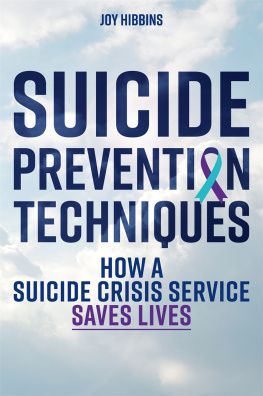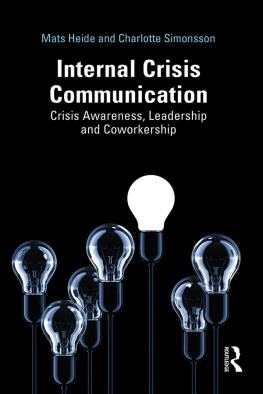CRISIS SERVICES AND HOSPITAL CRISES: MENTAL HEALTH AT A TURNING POINT
First published 1999 by Ashgate Publishing
Reissued 2018 by Routledge
2 Park Square, Milton Park, Abingdon, Oxon OX 14 4RN
711 Third Avenue, New York, NY 10017, USA
Routledge is an imprint of the Taylor & Francis Group, an informa business
Copyright Dylan Tomlinson and Kevin Allen 1999
All rights reserved. No part of this book may be reprinted or reproduced or utilised in any form or by any electronic, mechanical, or other means, now known or hereafter invented, including photocopying and recording, or in any information storage or retrieval system, without permission in writing from the publishers.
Notice:
Product or corporate names may be trademarks or registered trademarks, and are used only for identification and explanation without intent to infringe.
Publishers Note
The publisher has gone to great lengths to ensure the quality of this reprint but points out that some imperfections in the original copies may be apparent.
Disclaimer
The publisher has made every effort to trace copyright holders and welcomes correspondence from those they have been unable to contact.
A Library of Congress record exists under LC control number: 98074638
ISBN 13: 978-1-138-61163-4 (hbk)
ISBN 13: 978-0-429-46358-7 (ebk)
Kevin Allen is Research Officer at the University of Leeds, in the School of Sociology and Social Policy. He is also a Visiting Lecturer at South Bank University and is a co-editor of the journal Science, Discourse and Mind.
Tom Clarke works as a liaison mental health nurse in an Accident and Emergency Department in North London. He is currently undertaking research into the efficacy of mental health liaison services.
Paul Godin teaches sociology at City University. He has a clinical background in community psychiatric nursing and is presently undertaking a PhD study of community psychiatric nursing in Britain. Paul is a co-editor of the journal Science, Discourse and Mind.
Kevin Hogan is Head of Psychology at the University of Wolverhampton. He has had a long standing interest in organisational psychology and the work which he and his co-author report on in this book draws on his research in that area.
Pam Jenkinson conceived the idea of the Wokingham MIND Crisis House and took the leading part in its implementation, which she discusses in this book. The house has been open since 1991 and Pam has been concerned with both its running and the dissemination of information about the project throughout its history.
Tony Leiba is Assistant Dean, School of Nursing and Midwifery, City University. He has specialised in Community Psychiatric Nursing, the Sociology of Health of Illness and Interprofessional studies, having spent many years working with people who have presented as psychiatric emergencies.
Sarah Matthews is Team Leader of the Liverpool Crisis Service. She was the first member of staff to be appointed to the project during the early stages of its evolution, and has taken the service through from the planning to the implementation stage, with the official launch in 1998.
Sarah Orme is a Research Assistant at the University of Wolverhampton. She has worked on a number of projects concerned with crisis services, in conjunction with Kevin Hogan, and is undertaking a PhD study in this area.
David Pilgrim is a Consultant Clinical Psychologist at Queens Park Hospital, Blackburn, and also teaches and carries out research into the Sociology of Health and Illness at Salford University. He is the author of Psychotherapy and Society, published by Sage.
Val Radway is manager of the North Birmingham Home Treatment Service, and previously played a key role in the development of the West Birmingham Home Treatment Service, which she discusses in this book.
Shulamit Ramon is Professor of Interprofessional Health and Welfare Studies at Anglia Polytechnic University. She has studied and analysed mental health services for many years, in relation to both practice and policy, and is the author of a number of books in this area, including Mental Health in Europe: Beginnings and Rediscoveries, published by Macmillan.
Christopher Scanlon is a lecturer practitioner. He teaches mental health nursing at City University and works in a crisis intervention service in East London. His interests include group analysis and clinical supervision.
Dylan Tomlinson is Senior Lecturer in the Sociology of Health and Illness at South Bank University. He is co-editor, with John Carrier, of Asylum in the Community, published by Routledge.
Kevin Allen
Although mental health crisis services have become established at several sites in the United Kingdom over recent years, much of the literature that is available on these services describes a widely differing range of responses to the kinds of mental health crises that people experience. This is partly due to the fact that there has been little consensus on what is actually meant by the term crisis and how such crises that individuals experience might be best resolved.
At the beginning of this book it is therefore appropriate to examine something of what has been said about crisis and to briefly review the various kinds of intervention services that are currently in operation. There are two reasons for doing this: firstly, to begin to draw together what scattered literature is available; secondly, to enable those who are not already directly involved in this area, but who have an interest in mental health, to begin to make distinctions between those kinds of provision that are currently provided under the umbrella of crisis services and those that tend to fall within the remit of generic psychiatric services.
Although the notion of crisis has been present in discourse on mental health for more than three decades it was not until recently that forms of mental health provision that were based on crisis theory, began to be made available on a wider scale in the UK. As Wallcraft (1997) has noted crisis is not a term that is used very much in biomedical psychiatry. The very presence of the term crisis therefore gives rise to several important questions that we must address before we can begin to speak about crisis service provision, for example, in terms of its value or its effectiveness. We might therefore begin by reviewing what we mean by crisis. Where has this notion of crisis, as opposed to the terms nervous breakdown or mental illness, come from? When did it appear in discourse on mental health, and why? What has been said about it and by whom? If not from within psychiatry, then what circumstances allowed it to emerge in discourse on mental health at the particular time that it did, and at no other time before?
It is also particularly important to consider what is said by the users of the mental health services about what, in their view, constitutes a crisis. It is important to do so because the implication of the use of different forms of terminology within a disciplinary area suggests a divergence in meaning and interpretation. Such differences in interpretation have wider implications for discursive practices, the ways in which mental health is perceived and regarded, the ways in which it is addressed and by whom and the ways in which it is talked about, written about, and acted upon in terms of choices made in treatment. In particular, the significance of the inclusion of service users in a disciplinary area that has, for two centuries, been dominated by a medical model raises questions about the authority of the models of mental health it proposes (Wallcraft, 1996) and about the changing status of mental health in society.








